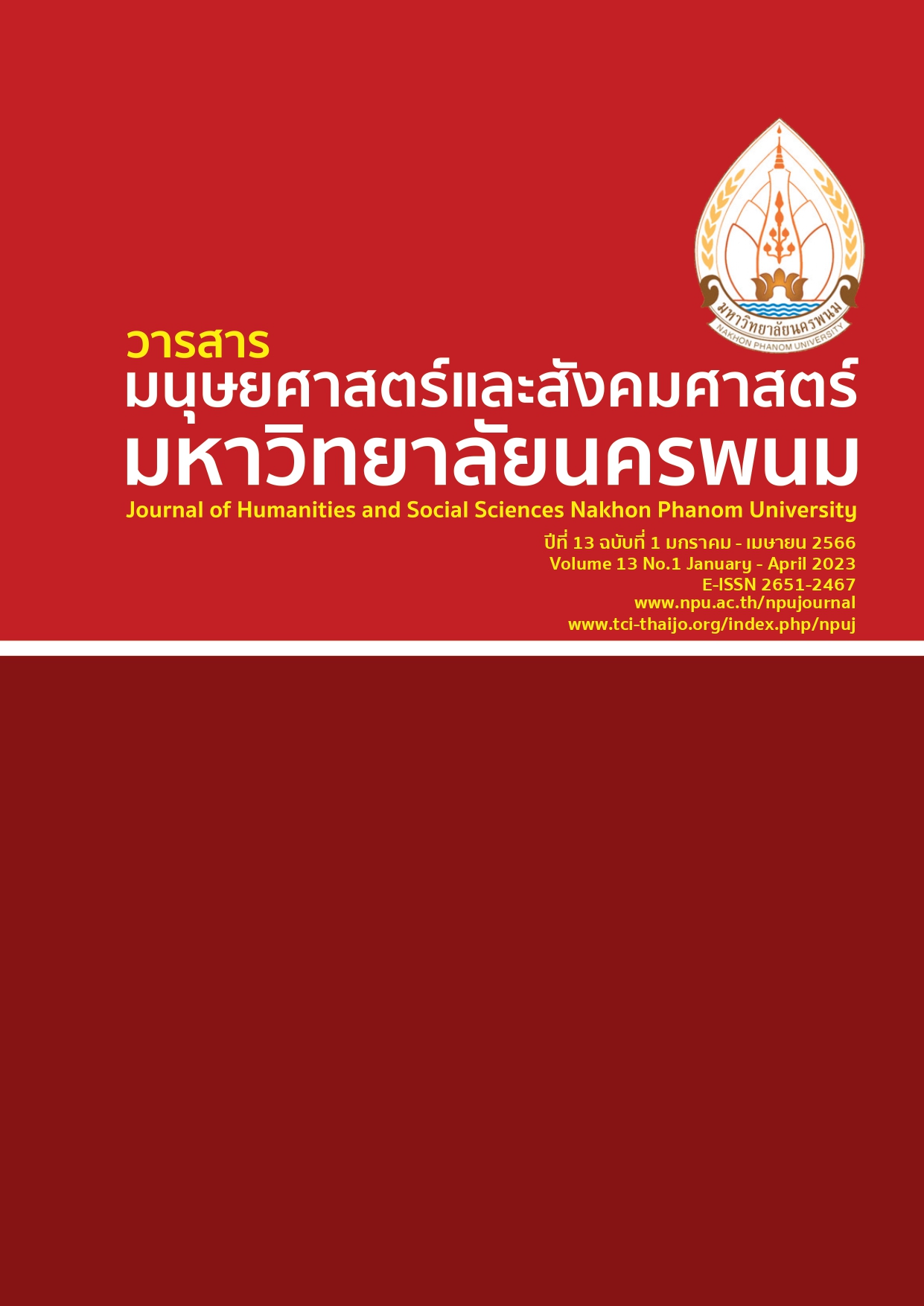Thai Undergraduate Students’ Motivation and Achievement in Learning Chinese as a Foreign Language: A Case Study at a Private University in Thailand
Main Article Content
Abstract
Abstract
This study aimed to investigate the way in which Thai undergraduate students in their first, second, third and fourth years of study were motivated to learn Chinese as their major in Thailand and test a hypothesis whether their motivation correlated with their learning achievement. Findings collected from 274 students randomly recruited at a private university with mixed research methods and the second language motivational self-system framework explained that they were inspired to learn Chinese due to their positive attitudes towards communicating with foreigners in Chinese fluently, using the language as a tool to have a good job and pursuing higher education in the future. Their personal and cultural duties to obey their parents and their personal values to finish the bachelor’s degree, their friendly and helpful classmates, useful Chinese teaching materials, interesting teaching approaches and useful Chinese classes highly inspired them to learn Chinese. The quantitative findings of motivation and the scores of the official HSK Test analyzed by Pearson Correlation disconfirmed the hypothesis perhaps because many students neither use Chinese to join any activities outside the class nor speak Chinese at home. The findings can be useful for lecturers of Chinese in a Thai context, where Thai is the only language officially used in Thailand, to be aware of the study environment and consider giving more opportunities to their Thai students to Chinese exposure both inside and outside of the class. Activities such as affordable excursions and short-term exchange programs are recommended.
Article Details

This work is licensed under a Creative Commons Attribution-NonCommercial-NoDerivatives 4.0 International License.
References
References
Bergman, M. M. (2008). Advances in Mixed Methods Research Theories and Applications. Britain: The Cromwell Press Ltd, Trowbridge, Wiltshire.
Bujang, M. A., Omar, E. D., and Baharum, N. A. (2018). A Review on Sample Size Determination for Cronbach’s alpha Test: A Simple Guide for Researchers. The Malaysian Journal of Medical Sciences: MJMS, 25(6), 85. 85–99. https://doi.org/10.21315/mjms2018.25.6.9.
Chang, W. Y. (2019). Building an Effective Learning Environment for Chinese Language Learners. Doctoral dissertation. America: Utah State University. https://doi.org/10.26076/5805-e1f1.
Chen, J. Y. W. (2022). Implementation of the Hanyu Shuiping Kaoshi and Its Home Edition during the Covid-19 Pandemic: A Survey of European Test Centres. International Journal of Chinese Education, 11(2), 1-12. https://doi:10.1177/2212585X221100877.
Dewi, K. (2020). Learning Motivation of Chinese Language Department Students in Bunda Mulia University Indonesia. Journal Bahasa dan Budaya China, 8(1), 25-34.
Dörnyei, Z. (2005). The Psychology of the Language Learner: Individual Differences in Second Language Acquisition. Mahwah: Lawrence Erlbaum Associates.
Dörnyei, Z. (2014). Motivation in Second Language Learning. In Marianne Celce-Murcia, Donna M. Brinton, and Marguerite Anne Snow (Eds.), Teaching English as a second or foreign language. The United States of America: Sherrise Roehr.
Hadi, M. S., Izzah, L., and Masae, M. (2021). Factors Affecting Speaking Anxiety of Thai Students during Oral Presentation: Faculty of Education in TSAI. English Language in Focus (ELIF), 3(1), 79-88. https://doi.org/10.24853/elif.3.1.79-88.
Huang, E., and Lynch, R. (2019). Perception of Parental Encouragement for Learning Chinese with Chinese Academic Achievement of Grade 3, Grade 4, and Grade 5 students at an International School. Scholar: Human Sciences, 11(1), 70-79.
Hussein, S. B., and Al Bajalani, F. (2019). The role of Motivation in Developing Autonomy among University EFL Students in the Kurdistan Region of Iraq: Students’ Attitudes. Journal of Garmian University, 6(1), 517-533. https://doi.org/10.24271/garmian.1030.
Kong, J. H., Han, J. E., Kim, S., Park, H., Kim, Y. S., and Park, H. (2018). L2 Motivational Self-system, International Posture, and Competitiveness of Korean CTL and LCTL College Learners: A Structural Equation Modeling Approach. System, 72, 178-189. https://doi.org/10.1016/j.system.2017.11.005.
Li, Q., and Diamantidaki, F. (2018). Every Cloud has a Silver Lining: Learning Mandarin during COVID-19. In C. H. Xiang (Eds), Trends and Developments for the Future of Language Education in Higher Education. UK: IGI Global.
Lin, C. (2018). Motivation in US Learners of Mandarin as a Foreign and Heritage Language. Doctoral dissertation. Manoa: University of Hawaii.
Riengthong, D. (2021). Factors Affecting the Efficiency of Teaching and Learning Chinese Language in the Secondary Schools under the Secondary Educational Service Area Office 1-3. Turkish Journal of Computer and Mathematics Education (TURCOMAT), 12(12), 313-323.
Subekti, A. S. (2018). L2 Motivational Self System and L2 Achievement: A Study of Indonesian EAP Learners. Indonesian Journal of Applied Linguistics, 8(1), 57-67. https://doi: 10.17509/ijal.v8i1.11465.
Suvongse, N., and Chanyoo, N. (2022). Factors Contributing to Willingness to Communicate in English of Thai Undergraduate Students in the Immersion Programs. Theory and Practice in Language Studies, 12(4), 763-771. https://doi.org/10.17507/tpls.1204.17.
Taguchi, T., Magid, M., and Papi, M. (2009). The L2 Motivational Self-system among Japanese, Chinese, and Iranian Learners of English: A Comparative Study. In Z. Dörnyei and E. Ushioda (Eds.), Motivation, Language Identity and the L2 Self. UK: Multilingual Matters, Caledon.
Worawiwat, T., and Qian, S. (2019). The High-efficiency and Intensive Chinese Program for Thai Students on Short-term Chinese Training Course in China: Thai High School Students Program in KUST. NIDA Development Journal, 59(3), 1-26.
Xu, W., Zhang, H., Sukjairungwattana, P., and Wang, T. (2022). The Roles of Motivation, Anxiety and Learning Strategies in Online Chinese Learning among Thai Learners of Chinese as a Foreign Language. Frontiers in Psychology, 13, 1-19. https://doi:10.3389/fpsyg.2022.962492.
Zeng, Q., Wang, G. W., Qu, C., and Li, K. X. (2018). Impact of the Carat Canal on the Evolution of Hub Ports under China’s Belt and Road Initiative. Transportation Research Part E: Logistics and Transportation Review, 117, 96-107. https://doi.org/10.1016/j.tre.2017.05.009.
Zheng, Y., and Lynch, R. (2021). A Correlational Study of Motivation and Language Anxiety for Learning Chinese as a Foreign Language with Chinese Academic Achievement of Thai Grade 6 Students. AU Virtual International Conference Entrepreneurship and Sustainability in the Digital Era, 2 (1), 347-355.


